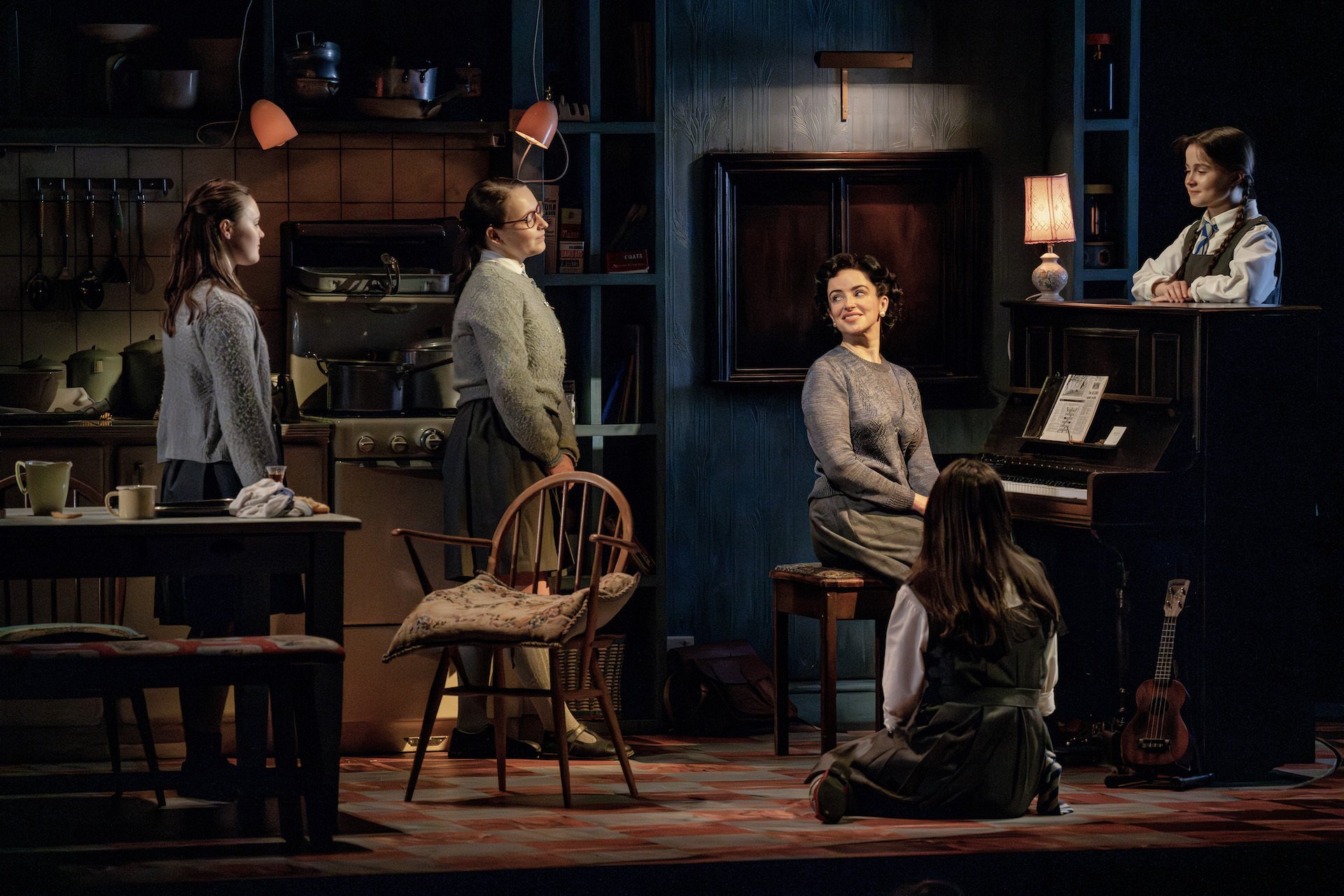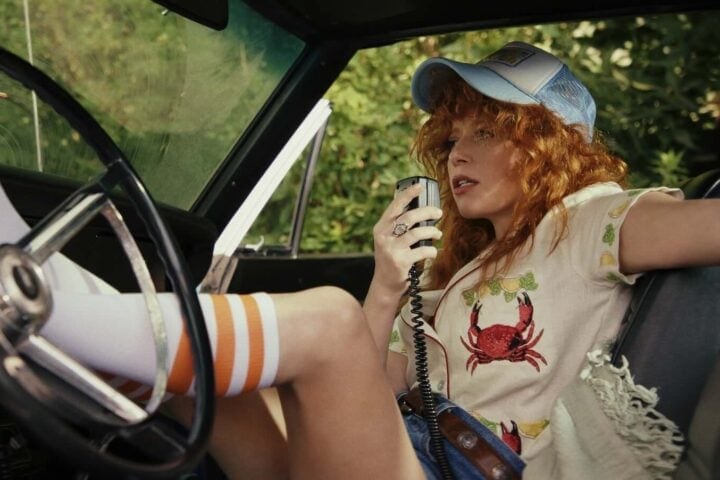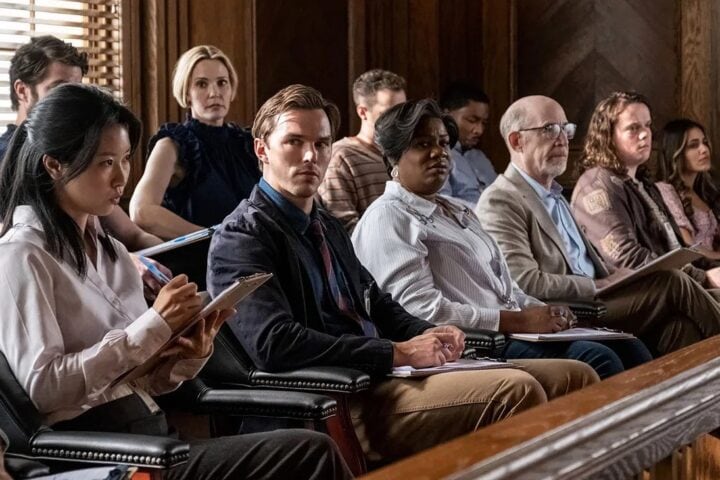“I can’t bear it,” Emily Webb mourns in the final minutes of Our Town, spectrally revisiting childhood scenes of her family after she’s been laid to rest. “They’re so young and beautiful. Why did they ever have to get old?” The unendurable passage of time haunts not only Kenny Leon’s wispy but lovely production of Thornton Wilder’s American epic (the fifth Broadway revival since its original 1938 run), but also a new spellbinding play recently arrived from London, Jez Butterworth’s The Hills of California.
If Wilder, in eschewing the use of scenery and most props in Our Town, was an early minimalist, Butterworth imagines his worlds on a maximalist scale. His last Broadway play, the thunderously searing The Ferryman, featured a live goose, rabbit, and baby on stage. And though The Hills of California has no animals to speak of, it has a beast of a set from Rob Howell, enormous staircases that revolve and transform, revealing rooms that communicate how the past is both out of reach and inescapable at the same time.
Across this massive production, meticulously staged by Sam Mendes, the past seeps into every space in the house as three sisters keeping vigil in the parlor of the Seaview Luxury Guesthouse and Spa as their mother Veronica (Laura Donnelly)—who once ran the hotel, which offers neither spa nor sea view—dies agonizingly upstairs. And though The Hills of California runs nearly three hours, its sense of bigness comes from the depths that it plumbs.
Set in Blackpool, a seaside town in Lancashire, the play is immense from the first scene, in which Jill (Helena Wilson), who’s stayed home caring for her ailing mother for many a year, greets her visiting sisters, the caustic Gloria (Leanne Best) and fragile Ruby (Ophelia Lovibond), each of whom are in spark-less marriages, and anticipates the return of the prodigal eldest, Joan. Butterworth excels at keeping us attuned to the unseen space between the two time periods he shows us: 1955, when the sisters were young teenagers under the thumb of their demanding stage mother, and 1976, as they’re on the cusp of finally being free of her. The latter scenes tremble with the weight of those intervening decades, the impossibility of the sisters revisiting their former selves chafing against their need to make sense of what their childhood has done to them, and how they’re bound to who they once were and what they once wanted.
What they wanted—or what Veronica wanted for them, at least—was to become a British facsimile of the Andrews Sisters, a quartet, or, perhaps, to better mirror the American squad, a trio, with Gloria as the “spare wheel” as Veronica puts it cruelly. There’s a richly tender and tense camaraderie among the four actresses playing the young versions of the sisters, with an especially endearing impudence from Lara McDonnell as the eldest sister Joan.
Wickedly tough and pugnaciously brilliant, she’s like her mother, so much so that when Joan finally returns home 20 years later, Donnelly also plays the adult Americanized Joan. Butterworth has pulled out all the stops for Donnelly, his partner and apparent muse (she also stole the show from that goose in The Ferryman), to give an audaciously sweeping performance. As Veronica, she’s self-destructively steely, desperately trying to convince herself that her daughters have the talent she needs from them. Watching the quartet perform “Boogie Woogie Bugle Boy” for a talent agent, Veronica does the dance along with them from the corner, but her moves are almost mechanical. She’s too tightly wound, it seems. She needs it—fame, success, escape—just a little too much to find grace or comfort in her own body.
As Joan, though, Donnelly is fully unwound, loose and droll and almost serene in her certainty that she’s free from her adolescence—and from a grievous wrong done to her by her mother. “I know this is a rough time for y’all,” she tells her sisters casually, as if her mother’s death couldn’t possibly have any relevance to her liberated existence. For Donnelly, who’s well-matched in each of her scene partners who bring their characters gradually, potently into focus, it’s a stunning Janus-like dual performance, with one face looking to the future and other to the past.
Emily (Zoey Deutch), who eventually speaks the playwright’s crucial call to attention in Our Town, steps back into the scenes of her own past with a meta-theatrical assist from the narratorial Stage Manager (Jim Parsons). We’ve watched her come of age, fall in love with her neighbor George (Ephraim Sykes), grow into marriage through Wilder’s carefully constructed snapshots of the intertwining lives in one small New Hampshire town.
Leon’s Our Town begins more widely with a flurry of prayers in counterpoint—Christian hymns, the Jewish sh’ma, Muslim chant—and his vision of Grover’s Corners is racially harmonious, comfortable in an expansive diversity that the staging never overemphasizes. (Emily’s family is white, George’s family is Black.) These are welcoming and welcome gestures, as are lighting designer Allen Lee Hughes’s cascading lanterns like a highway of souls, the century-spanning music, and the ease with which characters communicate in ASL. (The Deaf actor John McGinty plays the milkman Howie Newsome with amusing exasperation.)
But Leon allows a little too much languidity that drifts toward blandness in some of the performances, especially Parsons’s genially indistinct Stage Manager and Katie Holmes’s under-nuanced Mrs. Webb. Leon leans so heavily into Wilder’s suggestions of pantomimed propless staging that the detailed miming of kitchen work sometimes distracts from the dialogue and threatens to overwhelm the otherwise-tender performance of Michelle Wilson as matriarch Mrs. Gibbs. The most sparkling moments in the play come from the two fathers, with the ever-excellent Billy Eugene Jones as Dr. Gibbs and the wry Richard Thomas as Mr. Webb, who breathe specific humor and winking warmth into their largely mimeless scenes.
Leon has admirably made Grover’s Corners into an inclusive utopia beyond the monochromatic New England idylls that Wilder would have imagined 85 years ago. But in doing so, he also seems to have smoothed out not only the conflict that would prevent a diverse town from thriving in 1938 but also eliminated too much of the drama that ripples throughout any community. Until death strikes, late in the play, few scenes feel loaded with enough specificity in characterization to generate much tension at all, making for a placid but not very gripping first half. (Leon has removed the intermission to get the running time below two hours.)
Our Town, though, is a play not about death but about how to live. And if the final scene, in which Wilder tears down the shutters to stare directly at the audience, asking whether our lives have been lived less than fully, pummels across the footlights with the blistering force that it does here, Our Town has done its job. When Emily, whom Deutch, in her Broadway debut, lends a healthy balance of melancholy and cheekiness, pleads, “Do any human beings ever realize life while they live it?,” Leon lets Wilder take us by the shoulders and shake.
The Hills of California is now running at the Broadhurst Theatre, and Our Town is now running at the Barrymore Theatre.
Since 2001, we've brought you uncompromising, candid takes on the world of film, music, television, video games, theater, and more. Independently owned and operated publications like Slant have been hit hard in recent years, but we’re committed to keeping our content free and accessible—meaning no paywalls or fees.
If you like what we do, please consider subscribing to our Patreon or making a donation.





